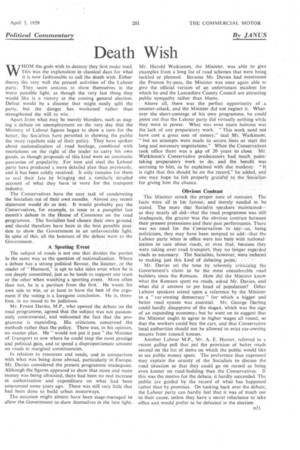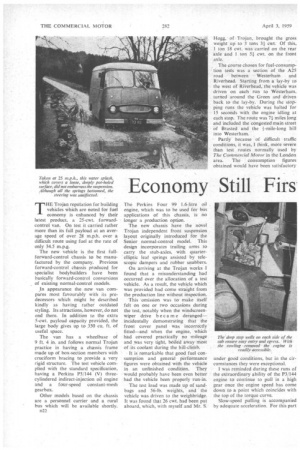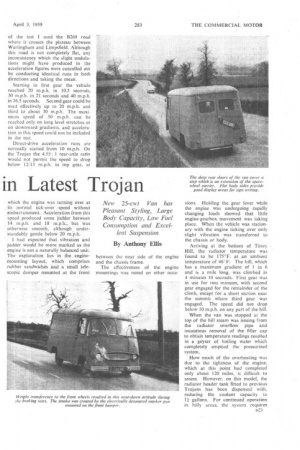Death Wish
Page 69

Page 70

Page 71

If you've noticed an error in this article please click here to report it so we can fix it.
II 7HOM the gods wish to destroy they first make mad.
1 This was the explanation in classical days for what it is now fashionable to call the death wish. Either
theory fits very well the present activities of the Labour party. They seem anxious to show themselves in the worst possible light, as though the very last thing they would like is a victory at the coming general election. Defeat would be a disaster that might easily split the party but• the danger has weakened rather than strengthened the will to win.
Apart from what may be Merely blunders, such as stag ing a debate on unemployment on the very day that the Ministry of Labour figures began to show a turn for the better, the Socialists have persisted in showing the public the more repellent side of their policy. They have spoken about nationalization of.. road haulage, combined with restrictions on the right of ..the trader to ,carry his own goods, as though proposals of this kind were an automatic guarantee of popularity. •For iron and steel the Labour party have produced a more detailed plan than previously, and it has been coldly received. It only remains for them to seal their fate by bringing duf a similarly detailed account of what they have in store for the transport industry.
The Conservatives have the easy task of condemning
the Socialists out of their Own,mouths. Almost any recent statement would do as text. It would probably pay the Conservatives, for example, to issue as a pamphlet last month's debate in the House of Commons on the road programme. The Socialists had chosen their own ground, and should therefore have been in the best possible position to show the Government in an unfavourable light. In spite of this, all the honours of the debate went to the Government.
A Sporting Event The subject of roads is not one that divides the parties in the same way as the question of nationalization. Where a debate has a strong political flavour, the listener, or the reader of "Hansard," is apt to take sides even when he is not deeply committed, just as he tends to support one team or the other when watching a sporting event. More often than not, he is a partisan from the first. He wants his own side to win, or at least to have the best of the argument if the voting is a foregone conclusion. He is, therefore, in no mood to be judicious.
Mr. Ernest Davies, M.P., who opened the debate on the road programme, agreed that the subject was not passionately controversial, and welcomed the fact that the programme is expanding. His criticisms concerned the methods rather than the policy. There was, in his opinion, no master plan. He "would not put it past" the Minister of Transport to sow where he could reap the most prestige and political gain, and to spend a disproportionate amount on roads in marginal constituencies.
In relation to resources and needs, and in comparison with what was being done abroad, particularly in Europe, Mr. Davies considered the present programme inadequate. Although the figures appeared to show that more and more money was being allocated, there had been no real increase in authorization and expenditure on what had been anitounced some years ago. There was still very little that had been done to build urban motorways.
The occasion might almost have been stage-managed to allow the Government to show themselves in the best light. Mr. Harold Watkinson, the Minister, was, able to give examples from a long list of road schemes that were being tackled or planned. Because Mr. Davies had mentioned the Preston by-pass, the Minister was once again able to give the official version of an unfortunate incident for which he and the Lancashire County Council are attracting public sympathy rather than blame.
Above all, there was the perfect opportunity of a counter-attack, and the Minister did not neglect it. Whatever the short-comings of his own programme, he could point out that the Labour party did virtually nothing while they were in power. What was even more heinous was the lack of any preparatory work. "This work need not have cost a great sum of money," Said .Mr. Watkinson, " but no attempts were made to secure. lines or start the long and necessary negotiations." When the Conservatives took office there was a gap of 20 years to dose.. Mr. Watkinson's Conservative predecessors had much
taking preparatory work to do,: and the benefit was accruing to him, as he explained with due modesty: " It is right that this Should be on the record," he ,added, and one may hope he felt properly grateful to the SOCialists for giving him the chance. "
Obvious Contrast
The Minister struck the proper note of restraint. The
facts were his'favour, and riaerely needed to 116 stated. The more that • Socialist speakers, maintained,— as they nearly all did—that the'road programme 'was Still inadequate, the greater 'was the obvious contrast -between their present .preteri.sions andtheirpastpeeformanCe. There was' no :needfOr the: ConserVativesSay=as, being politicians, they may' have been tempted to acld—Ithat the Labour party.when in office were too, In* with nationalization AO care about roads, -or even that, because they were . taking over, road, transPOrt; they -no* -longer regarded roads as necessary'. The Socialists, however, were-reduced to making just this kind -Of debatingpoint',
Mr. Davies set the tone by solemnly criticizing the Government's claim to be the most considerable road builders since the Romans. How did the Minister know what the Romans spent on roads, asked Mr. Davies, and what did it amount to per head of population? Other Labour speakers seized upon a reference by the Minister to a "car-owning democracy" for which a bigger and better road system was essential. Mr. George Darling could hardly disapprove of the slogan, which was the sign of an expanding economy; but he went on to suggest that the Minister ought to agree to higher wages all round, so• that the workers could buy the cars, and that Conservative local authorities should not be allowed to evict car-owning tenants from council houses.
Another Labour M.P., Mr. A. E. Hunter, referred to a recent gallup poll that put the provisionof better roads second on the list of items on which the public would like to see public money spent. The preference thus expressed may explain the anxiety of the Socialists to discuss the road situation so that they could go on record as being even keener on road-building than the Conservatives. If this was the motive for the debate, it hardly succeeded. The public are guided by the record of what has happened rather than by promises. On looking back over the debate, the Labour party can hardly feel that it was of much use to their cause, unless they have a secret reluctance to take office and would prefer to be defeated in the election.
Hogg, of Trojan, brought the gross weight up to 3 tons 3+ cwt. Of this, 1 ton 18 cwt. was carried on the rear axle and 1 ton 5+ cwt, on the front axle.
The course chosen for fuel-consumption tests was a section of the A25 road between Westerham and Riverhead. Starting from a lay-by to the west of Riverhead, the vehicle was driven on each run to Westerham, turned around the Green and driven back to the lay-by. During the stopping runs the vehicle was halted for 15 seconds with the engine idling at each stop. The route was 7+ miles Jong and included the congested main street of Brasted and the 3-mile-long hill into Westerham.
Partly because of difficult traffic conditions, it was, I think, more severe than test routes normally used by The Commercial Motor in the London area. The consumption figures obtained would have been satisfactory
of the test I used the B269 road where it crosses the plateau between Warlingham and Limpsfield. Although this road is not completely flat, any inconsistency which the slight undulations might have produced in the acceleration figures were cancelled out by conducting identical runs in both directions and taking the mean.
Starting in first gear the vehicle reached 20 m.p.h. in 10.5 seconds, 30 m.p.h. in 21 seconds and 40 m.p.h. in 36.5 seconds. Second gear could be used effectively up to 20 m.p.h. and third to about 30 m.p.h. The maximum speed of 50 m.p.h. can be reached only on long level stretches or on downward gradients, and acceleration to this speed could not be included in the test.
Direct-drive acceleration runs are normally started from 10 m.p.h. On the Trojan the 4.55: 1 rear-axle ratio would not permit the speed to drop below 12-13 m.p.h. in top gear, at
































































































































